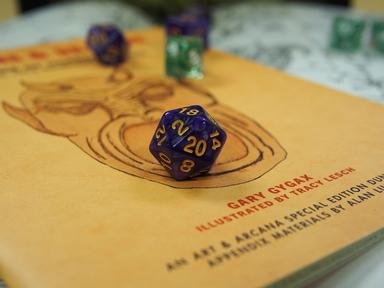Quiz Answer Key and Fun Facts
1. Many cantrips refer to fire or flames in their names, but they can have wildly varying effects. Which of these cantrips does not damage a target?
2. Which of these is the name of a first-level spell that can be used to incapacitate a target?
3. This second-level spell is a favorite of the character Merle in The Adventure Zone. Available to clerics, paladins, and bards, it can prevent a target from lying.
4. Fireball, a third-level spell, is perhaps the most iconic Dungeons and Dragons spell. It is generally restricted to wizards and sorcerers, but certain feats and subclasses allow other characters to learn it. Which of these subclasses can learn Fireball at fifth level?
5. At seventh level, many characters are able to learn the fourth-level spell Polymorph, which allows the caster to transform a target, either willing or unwilling, into another type of creature, with some restrictions. Which of these forms could a seventh level wizard turn into using Polymorph?
6. Reincarnate and Raise Dead are both fifth-level spells that can bring a dead character back to life. What is the most crucial difference between these spells?
7. The sixth-level spell Disintegrate is a powerful damage spell that does a massive amount of force damage. Additionally, what happens to a character killed by Disintegrate?
8. Many characters of D&D lore now have spells named after them. Who is the namesake of the seventh-level "Magnificent Mansion" spell?
9. Eighth-level spells can be very powerful, allowing characters to significantly weaken their enemies or strengthen their allies. Which of these eighth-level spells should you probably not cast on an enemy?
10. Wish, a ninth-level spell, is perhaps the most powerful spell in the game, allowing the caster to do just about anything, as long as the DM agrees. However, under most circumstances, casting Wish immediately significantly weakens the caster. In which case does this NOT occur?
Source: Author
rose1729
This quiz was reviewed by FunTrivia editor
WesleyCrusher before going online.
Any errors found in FunTrivia content are routinely corrected through our feedback system.
